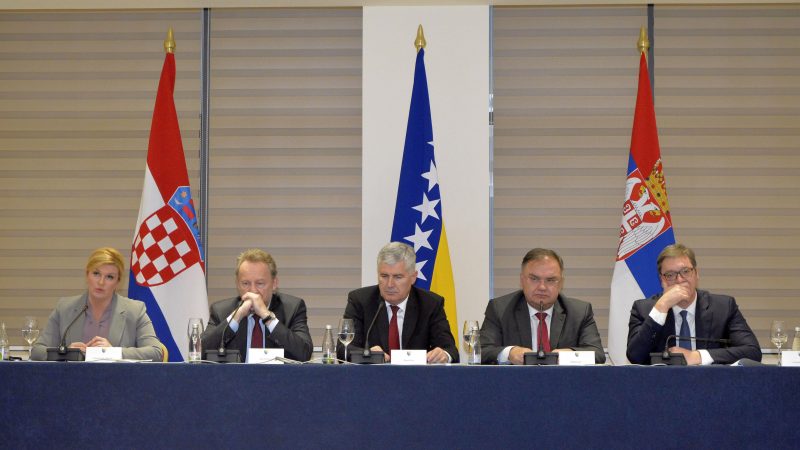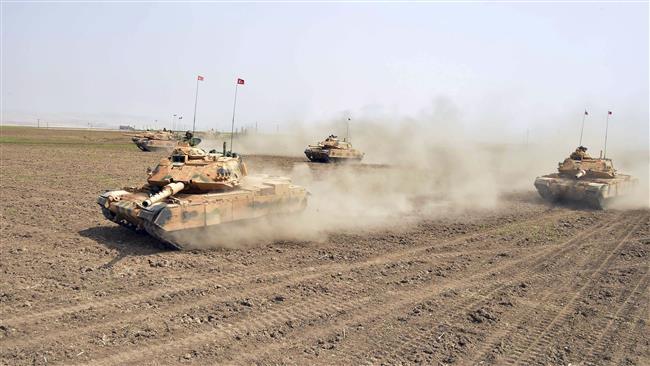Download PDF :


Euractiv (8 March 2018)
The March 6 meeting in the Bosnian city of Mostar came after the EU unveiled its new enlargement strategy for the Western Balkans in early February, stressing further enlargement will follow only after bilateral disputes in the region have been resolved.
Croatia is an EU member, Serbia is a candidate and Bosnia a potential candidate. All three are former Yugoslav republics with a number of unresolved issues dating back to the bloody collapse of Yugoslavia in the 1990s. Serbia and Croatia are co-signatories of the 1995 Dayton peace agreement that ended the war in Bosnia.
The meeting showed that the only thing flourishing in this triangle is trade, with Serbia emerging as the dominant force thanks to a large surplus in trade with Bosnia and, for the first time, a surplus in trade with Croatia in 2017.
The three members of the Bosnia-Herzegovina Presidency, Croatian President Kolinda Grabar-Kitarović and Serbian President Aleksandar Vučić showed renewed good will and readiness to deal with the open bilateral issues.
However, the positions of the Serbian president and the Bosniak member of the Bosnian Presidency, Bakir Izetbegović, on the border between the two countries remained far apart and the two engaged in verbal sparring, just like they did during the Bosnian Presidency members’ visit to Belgrade last December.
Izetbegović told a press conference after the Mostar meeting that Bosnia could not agree to Serbia’s border proposal, adding that “if no solution is found, the countries may solve the problem via international arbitration”.
Vučić responded by saying Serbia had delivered to Bosnia a new proposal for the border on the river Drina, which contained a highly favourable offer to Bosnia, and quipped that Izetbegović “obviously hasn’t read it”. Bosnia has an election coming up in October so the border issue is unlikely to be resolved before then.
The Croatian president described the meeting in Mostar as extremely useful because, apart from the inherited problems, there had also been talk of cooperation.
Grabar-Kitarović also said that the main topic was the Commission’s Strategy for the Western Balkans and that Croatia would aim to do as much as possible to encourage the European integration of Bosnia, which is still waiting to be granted the status of an EU candidate.
During Commission President Jean-Claude Juncker’s visit to Bosnia in February, the country handed the European officials answers to the EC Questionnaire, a key step before assessing if a country can become an official candidate, and Juncker said that from now on Bosnia and Europe would go together.
In terms of economy, the Croatian president said she saw the joint participation of Bosnia, Croatia and Serbia in third markets in the future, while the Serbian president once again spoke of a kind of economic union in the region.
Vučić underscored that administrative barriers between the three states should be lifted, adding that the rates of customs duties, taxes and subsidies should be equalised. That, Vučić pointed out, is not the creation of a new Yugoslavia, but rather a need for establishing stability and economic development.
“It is up to us to make a framework in which people will feel safe, that they can work and earn more and have a better life,” said the Serbian president.
Vučić announced that the Croatian president Grabar-Kitarović was to visit Belgrade soon and added that all the demands of the Croatian minority in Serbia would be resolved by then.
He also said the next trilateral meeting should take place in Novi Sad, the capital of the northern Serbian province of Vojvodina.
https://www.euractiv.com/section/enlargement/news/croatia-serbia-bosnia-show-new-will-to-solve-disputes/

 TURKEY, IRAQ TO CARRY OUT JOINT OPERATION AGAINST PKK IN IRAQ
Iraq
09.03.2018
TURKEY, IRAQ TO CARRY OUT JOINT OPERATION AGAINST PKK IN IRAQ
Iraq
09.03.2018




























